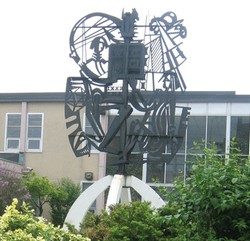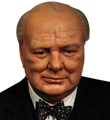Winston Churchill Collegiate Institute
|
| updated |
Copy Link Code
|
 As a small boy, Winston Churchill's education was nearly a disaster. His governess – a very stern, strict, unaffectionate woman – inspired fear in her tiny pupil. So intense was his fear, that Winston's favored nanny (Mrs. Everest) gave him a book to read entitled Reading Without Tears, to help him learn to read without crying. Unfortunately, according to Churchill himself – in his book My Early Life – the book did not do its job, for he frequently resorted to sobs, with an adamant refusal to continue his lessons.
As a small boy, Winston Churchill's education was nearly a disaster. His governess – a very stern, strict, unaffectionate woman – inspired fear in her tiny pupil. So intense was his fear, that Winston's favored nanny (Mrs. Everest) gave him a book to read entitled Reading Without Tears, to help him learn to read without crying. Unfortunately, according to Churchill himself – in his book My Early Life – the book did not do its job, for he frequently resorted to sobs, with an adamant refusal to continue his lessons.
Despite his governess' attempts to teach him, Winston was rebellious and too stubbornly independent to do well in school. He attended three different schools, as a young man. Unfortunately for young Churchill, he was somewhat chubby and even had a speech impediment – it's debated whether it was a lisp, a stutter, or both – and he did not receive very good grades in school. His father, who was extremely smart and was an accomplished scholar, found his oldest son bothersome and spent almost no time with him. His mother was stunningly beautiful, and enjoyed social events, where she was considered to be a charming and interesting guest. However, she too had no desire to spend time with her son, so it was really no surprise when Winston was sent away to boarding school.
When he was 12 years old, Winston Churchill's education truly began, upon his entry into Harrow School. Harrow was a boarding school, relatively close to London. Despite his previous failures in school, his time at Harrow helped him grow and mature. There, he began a lifelong love of writing and literature, which he carried with him to his dying day, leading to his Nobel Prize for literature. Curious about the wonders of the world, and particularly fascinated with literature, writing, and the written word, he had imagined himself walking in the hallowed halls of the respected universities of England. But his dreams would go unrealized, because his grades were so poor.
Even from the time he was a young boy, Winston's father was so irritated with what he thought was his son's inability to learn, he decided Winston would only be suited for the military. After twice failing the exam for entrance to the Royal Military Academy at Sandhurst, Winston found more unexpected success. While he was there, he was a class leader in fortifications and tactics, and found himself fascinated by other, previously unimagined subjects, such as topography and military law. He enjoyed drill, gymnastics, and riding; he drew maps of the area, designed plans for guards in the advance and rear, learned the basics of blowing up masonry bridges, and graduated eighth out of his class of 150. Following this success, he was appointed as second lieutenant in the Fourth Queen's Own Hussars cavalry regiment, hardly a month following the death of his disapproving and emotionally distant father.
Following his formal education, Churchill continued to teach himself by way of reading and learning on his own. His favorites included works by Thomas Macaulay and Edward Gibbons. Because of his family's power and influence, during his time in the military, he was frequently able to take a leave of absence to participate in military operations field reporting. During one particularly bloody, hand-to-hand battle in northwestern India, he managed to avoid injury or death, while acting as a paid reporter, writing about the fierce fighting for two different newspapers.
